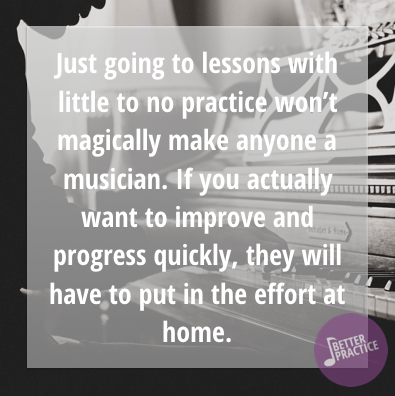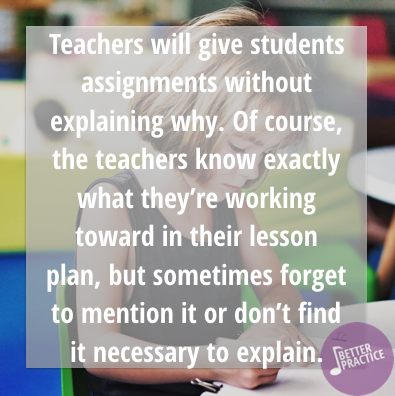Sometimes students go into lessons really wanting to learn. Others are put into lessons by their parents. Many are totally new to music and lessons in general.
Why should you have these conversations with your student?
Without these conversations, you and your student’s goals may be misaligned, they may not understand how to succeed, practice aimlessly, or as a result of the above, they may become less motivated. Here, we’ll outline 4 conversations that are important to have with your music students. You can have these conversations at any time, although most are best in the beginning of lessons or before you start a new piece.
1. Why do you want to learn music? What are your goals?
It’s good to understand your students’ goals so you can tailor your approach. After all, everyone is different – very different! It’s one thing to teach a student who is trying to get into a music college and/or become a professional musician, another to teach someone who purely just wants to learn to play for enjoyment. Learn why they are taking lessons and what they want to get out of it. Although I suspect a lot of “My parents said I had to”s – so, try to figure out what they like and what they’d be interested in learning. Also, keep in mind that their goals may change over time. Revisit this topic every year to make adjustments as needed.
2. Why practice matters most
Students don’t usually realize that lessons are just for learning, while the six days away from lessons are for mastering.
Anyone can “learn” how to do a backflip by watching videos. They can learn all the steps, but won’t actually be able to do it until they go out and try it – a.k.a. practice. The same goes for music. Just going to lessons with little to no practice won’t magically make anyone a musician. Students have to realize that if they actually want to improve and progress quickly, they will have to put in the effort at home. Make it clear that lessons are not the place that they are going to develop the mastery they need. So if they expect to actually play, they will need to practice. This then leads into knowing how to practice and how to set up an evironment and support system (parents) to make it happen.

3. How to practice effectively/Music practice tips and techniques
Many students, especially new music students, don’t know how to practice. Most don’t have the right expectations for practice and get easily demotivated (a common one is students thinking they should be able to play a difficult passage correctly up to speed after a few tries – when really it takes about 30 tries at a slower speed!). Also, other common things requiring practice like sports or math include practice with the coach/teacher multiple times a week. This is unlike music lessons, which typically only meet with the teacher once a week and are expected to improve on their own during the rest of the week. This can be unfamiliar territory and most students need help building good practice habits. Some teachers dedicate one to two lessons a year to teach the student how to practice. It’s worth it.
4. Why are you learning this piece? What is it you’re trying to learn or develop? How might you use it in the future?
Karate Kid comes to mind. For those of you who don’t know the story, Daniel, a boy struggling with bullies, goes to Mr. Miyagi, a karate master, for help. Mr. Miyagi agrees to train Daniel but gives him menial, tedious tasks (like waxing cars, painting fences, etc.) to do every day without telling him why. Daniel is understandably confused and frustrated until he (finally) learns that these tasks mimic karate moves.
It’s not the perfect analogy, but sometimes it’s like that! Teachers will give students technical exercises, scales, or pieces without explaining why the student would want to know this. Of course, the teachers know exactly what they’re working toward in their lesson plan, but sometimes forget to mention it or don’t find it necessary to explain that far ahead.
It can help bring a lot of understanding and importance to the various exercises (especially the tedious but necessary ones) when there’s a clear reason why they’re doing it.

We hope this helps provide a good guideline for understanding and helping your students. Sometimes getting Mr. Miyagi’d is cool, but I know most of the time for music I would think, “Why am I even learning this? What’s the point?” – so I didn’t absorb lessons as well as I should have. So, that last point would have really helped me practice better and understand lessons better.